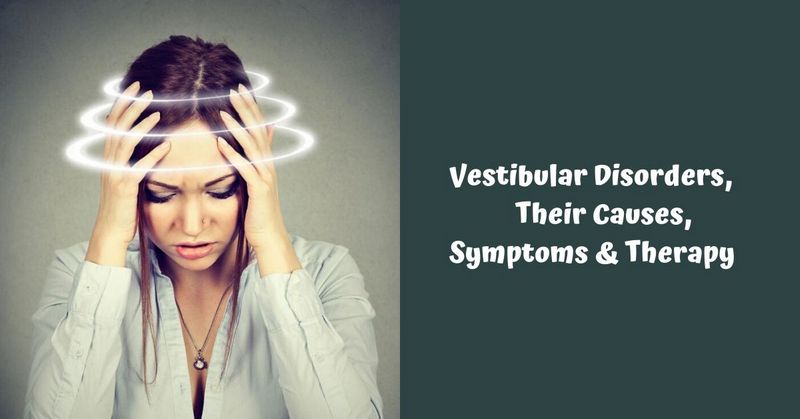Vestibular Disorders, Their Causes, Symptoms & Therapy

The vestibular apparatus is responsible for the orientation of a person in space and maintaining the balance of the body. Even a slight violation of its function leads to serious consequences that can quickly change the usual rhythm of the patient’s life.
If you notice any of the above symptoms, you should immediately consult a doctor who will conduct a comprehensive examination, determine the root cause of the problem and prescribe adequate vestibular therapy to restore normal function and return to a healthy life.
Types of vestibular disorders
- Meniere’s disease (a synonym for chronic remitting labyrinthopathy) is a chronic disease caused by a periodical increase in intralabyrinthine pressure (or labyrinth hydrops). The cause of hydrops is the excess production of the intralabyrinthine fluid of the endolymph, the violation of its circulation and reverse absorption. It occurs in the form of repeated bouts of dizziness with a sensation of movement of the surrounding objects or of the person him- or herself (vertigo), nausea and hearing impairment (usually on the one hand). Attacks can last from several hours to a day;
- Acute labyrinthopathy of vascular origin is a sudden decrease in hearing in one ear with severe dizziness with a sensation of movement of surrounding objects (vertigo), most often caused by an acute frolic circulatory disturbance in the inner ear;
- Chronic purulent otitis media is a chronic inflammatory process in the tympanic cavity, characterized by the presence of perforation of the tympanic membrane, suppuration and hearing loss. The inflammatory process can be accompanied not only by hearing loss, but also by dizziness and imbalance. If untreated, there is a danger of developing labyrinthitis (acute inflammation in the inner ear) and intracranial complications;
- Perilymphatic fistula is a pathological message between the inner and middle ear due to damage to the membranes located between them, accompanied by the outflow of fluid from the inner ear, perilymph, into the middle ear. It arises as a result of ear injury, barotrauma (with a difference in atmospheric pressure), and other reasons. The condition is accompanied by dizziness and one-sided hearing loss;
- Benign paroxysmal positional dizziness (synonym – otolithiasis) is a condition in which fragments of the otolith membrane (calcium carbonate crystals), usually located on the eve of the maze, due to trauma, age-related changes and other reasons, leave their location and end up in one of the semicircular channels (or in several semicircular channels). The displacement of detached otoliths arising at certain head positions and inclinations causes attacks of short-term dizziness. Depending on the location of the detached otoliths, kupulo- and canalolithiasis are distinguished;
- Vestibular neuronitis is an acute inflammation of the vestibular portion of the vestibulo-cochlear nerve and its vestibular ganglion, the most likely viral herpetic etiology. During the first 3-7 days, it manifests itself as acute vestibular syndrome – severe dizziness with a feeling of rotation of surrounding objects (vertigo), imbalance, nausea, followed by subsidence of symptoms for 2-4 weeks;
- Acoustic neurinoma (synonyms – statoacoustic nerve neuroma, vestibular schwannoma) is the benign formation of a statoacoustic nerve, causing unilateral hearing loss, often noise in the ear, dizziness and imbalance. In the absence of surgical treatment, neurinoma growth causes compression of various brain structures and can lead to life-threatening conditions;
- Motion sickness (synonyms – motion sickness, kinetosis) is a complex of symptoms in the form of nausea, increased salivation, malaise, which is provoked in some people by riding in transport (on a bus, car, plane, at sea), riding rides. It is caused by the development of vestibulo-autonomic symptoms, primarily in the form of nausea, in response to irritation of the vestibular apparatus in the above conditions.
Causes of vestibular disorders
Vestibular disorders are often caused by:
- head injuries;
- vestibular neuritis (complications of a bacterial, viral infection);
- otitis media, other diseases of the inner ear;
- tumors;
- ischemia (insufficient blood supply) of the visual, vestibular parts of the brain;
- fluid accumulation in the labyrinth cavity (Meniere’s disease);
- multiple sclerosis;
- cerebral infarction;
- stress;
- vasculitis;
- basilar migraine;
- increased blood viscosity;
- condition after a seizure of epilepsy;
- the cause of some dizziness that does not entail negative consequences has not been established.
Signs of malfunctions are usually manifested by seizures between which the person feels healthy. An exacerbation can be triggered by a loud sound, a strong odor, a change in weather, a sharp movement of the head, stress, or no apparent reason.
Symptoms of vestibular disorders
Usually, a patient observes the following symptoms:
- vomiting, nausea;
- dizziness, fainting;
- difficulty maintaining balance;
- increased sweating;
- nystagmus – trembling of the eyeballs;
- loss of clarity of vision, double vision, fog before the eyes;
- difficulties with speech;
- impaired coordination;
- malfunctioning of breathing, pulse, pressure surges, decrease in body temperature;
- pallor, red skin on the face, neck.
Therapy of vestibular disorders
Treatment of vestibular disorders requires a systematic approach, depending on the factors causing the pathology. Often, to eliminate the cause of the disease, a comprehensive examination and a long course of therapy are required. A vestibular therapist may prescribe:
- antiemetic drugs;
- nootropics;
- antihistamines;
- antispasmodics;
- benzodiazepines;
- anticholinergic drugs;
- diuretics;
- diet low in carbohydrates, salt;
- treatment of the underlying disease that caused the disorder (including surgery);
- vestibular gymnastics;
- herbal medicine – ginger, mint, honey, propolis, alcohol tincture of clover flowers.
